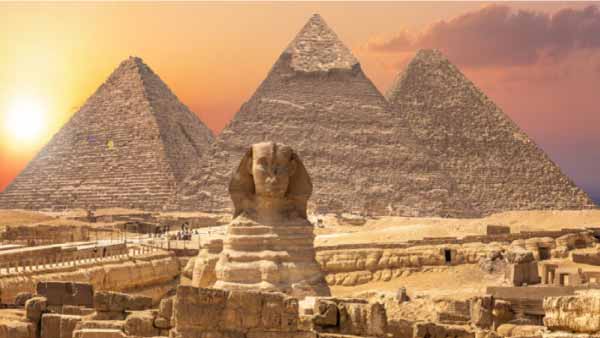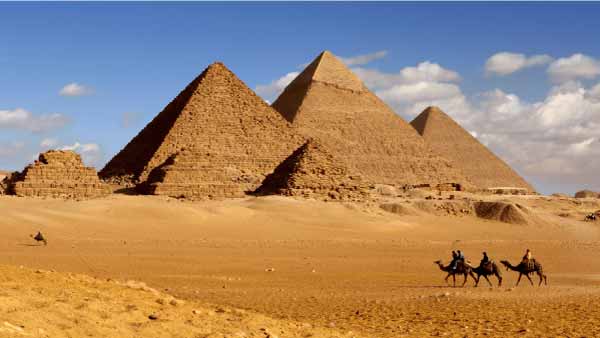The Egyptian civilization was one of the oldest and most enduring in the world, developing in northeastern Africa, along the Nile River valley from 3100 BC until the Roman conquest in 30 BC. During this period, the Egyptians made great advances in architecture, engineering, writing, arts, religion, and politics.
The Egyptian political system was headed by a pharaoh, who had absolute power over the entire country and was considered a divine figure. The pharaoh was surrounded by a court of nobles and officials, and the people were divided into social classes.
The Egyptians built impressive monuments, such as pyramids, tombs and temples, which remain a source of fascination and inspiration today. They also developed a hieroglyphic writing system, which allowed them to record their stories and knowledge for future generations.
Egyptian religion was polytheistic and revolved around the worship of a wide variety of gods and goddesses, who were related to nature, animals, and the afterlife. The Egyptians believed in the existence of an afterlife and developed complex funeral rituals to prepare the deceased for their journey to the afterlife.
In short, Egyptian civilization is one of the most fascinating and rich in the history of the world, and its legacy has left a lasting imprint on the culture and society of humanity.
Achievements of Egyptian Civilization
The Egyptian civilization was one of the most advanced in its time and its achievements extended to many areas, such as medicine, astronomy, mathematics and technology. The ancient Egyptians developed irrigation techniques that allowed them to control the flooding of the Nile River and grow large quantities of food. They also created advanced tools and techniques for the construction of monuments and buildings, such as the use of ramps and pulleys.
In the field of medicine, the Egyptians had a deep understanding of diseases and injuries, and developed surgical techniques and treatments that remain important in modern medicine. In addition, they developed a mathematical writing system, which allowed them to solve complex problems and perform advanced calculations.
Astronomy
Astronomy was also an important part of Egyptian culture, as it allowed them to predict the seasons and weather, as well as plan their calendar and religious rituals. They also believed in the existence of a wide variety of gods and goddesses, whom they worshipped in temples and monuments throughout the country.
The Egyptian economy was based on agriculture, but there was also a thriving trade with other regions of the world, such as Nubia, the Levant and the Mediterranean Sea. The Egyptians produced and exported a wide variety of products, such as linen, gold, papyrus and perfumes.
Egyptian civilization also experienced numerous political and social changes throughout its long history, including the unification of Upper and Lower Egypt under the reign of the first pharaoh, Menes, and the conquest of the country by the Persians, Greeks, and Romans.
In short, Egyptian civilization was one of the richest and most complex in history, with important contributions in areas such as architecture, medicine, astronomy, and technology. His legacy continues to be studied and admired around the world.
Artworks
The Egyptian civilization also had a rich artistic production, which extended throughout its long history. The Egyptians produced impressive works of art in stone, metal, ceramics, glass, and textiles, many of which depicted scenes from everyday life, religion, and mythology.
One of the most well-known art forms of the Egyptians are the pyramids, which were built as tombs for the pharaohs and their relatives. The pyramids were massive stone structures, built by workers who cut and transported huge blocks of stone by hand. The most famous are the pyramids of Giza, which are located on the outskirts of Cairo and remain one of the most visited tourist sites in the world.
In addition to the pyramids, the Egyptians also built other impressive monuments, such as temples, which were religious and administrative centers. The temples were decorated with sculptures and paintings depicting the gods and goddesses, and the pharaohs and their relatives.
The Egyptians also produced jewelry and ornamental objects, such as bracelets, necklaces, and earrings, which were worn by both men and women. Many of these jewels were decorated with religious symbols and representations of gods and goddesses.
Writing
Egyptian writing is another of the most important contributions of Egyptian civilization. The Egyptians developed a hieroglyphic writing system, which consisted of drawings and symbols depicting objects, people, animals, and concepts. This writing system was used to record the history, religion, literature and administration of the country.
In short, the Egyptian civilization was one of the most advanced and rich in the history of the world, with important contributions in areas such as architecture, art, writing, and technology. His legacy continues to be studied and admired around the world.
Religion of Egyptian Civilization
Religion was a central part of Egyptian culture, and most aspects of life were influenced by religion. The Egyptians believed in a wide variety of gods and goddesses, each of whom had a different function and personality. Some of the most important gods and goddesses include Ra, the sun god; Osiris, the god of death and resurrection; Isis, the goddess of motherhood and fertility; and Horus, the god of the sky.
The Egyptians also believed in life after death and in the need to preserve the body for the journey to the afterlife. For this reason, they developed advanced mummification techniques, which allowed the preservation of the body for centuries. They also built tombs and mortuary temples to honor the dead and provide them with what they needed in the afterlife.
The Egyptian social system was based on a hierarchy that included the pharaoh, priests, nobles, soldiers, and peasants. The pharaoh was considered the divine leader of the country and was responsible for maintaining law and order. Priests played an important role in the religion and administration of the country, while nobles and soldiers had access to education and wealth.
Agriculture and trade
Daily life in ancient Egypt was marked by agriculture and trade. Peasants worked in the fields, growing a wide variety of foods such as wheat, barley, lentils and vegetables. Artisans and merchants produced and sold goods in local markets and in other countries. Women also played an important role in Egyptian society, although their rights and opportunities were limited compared to men.
In short, the Egyptian civilization was one of the most advanced and wealthiest in the history of the world, with important contributions in areas such as religion, technology, writing, and art. His legacy continues to be studied and admired around the world.


